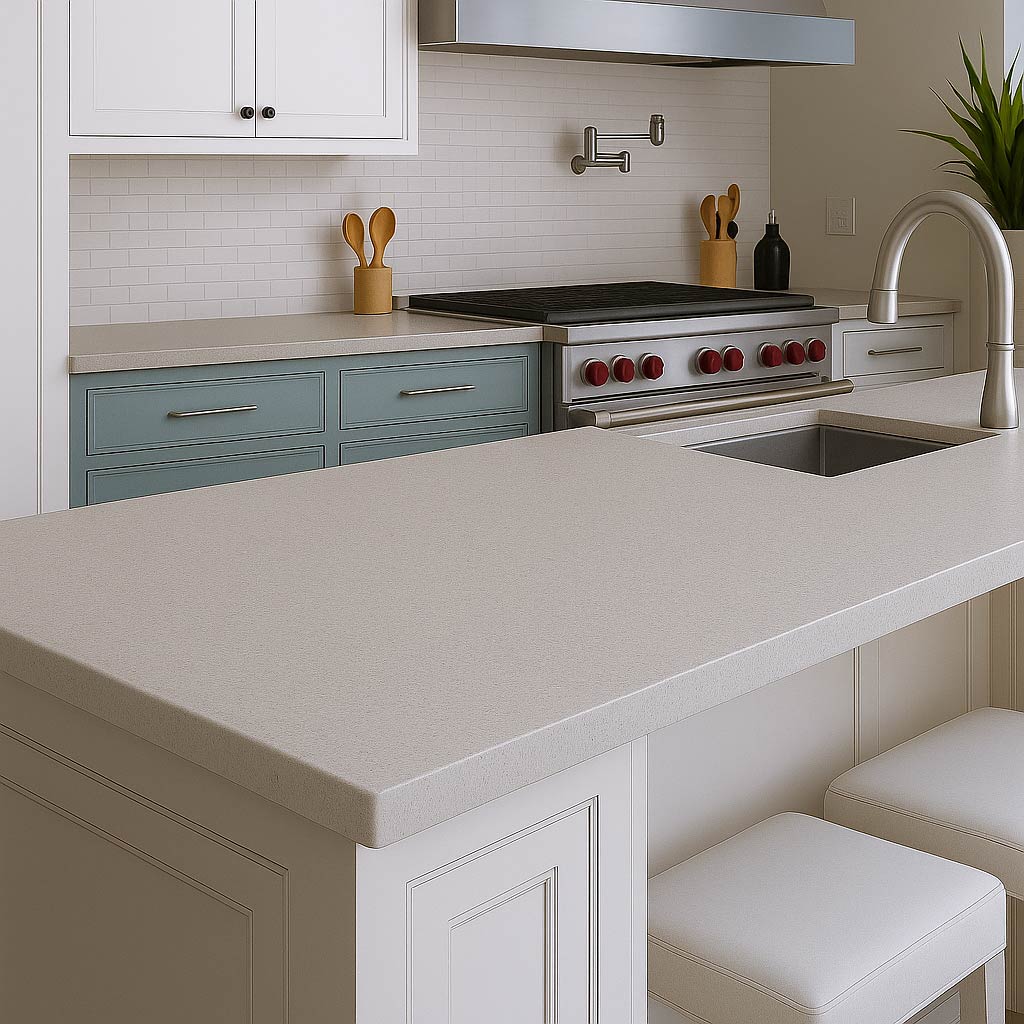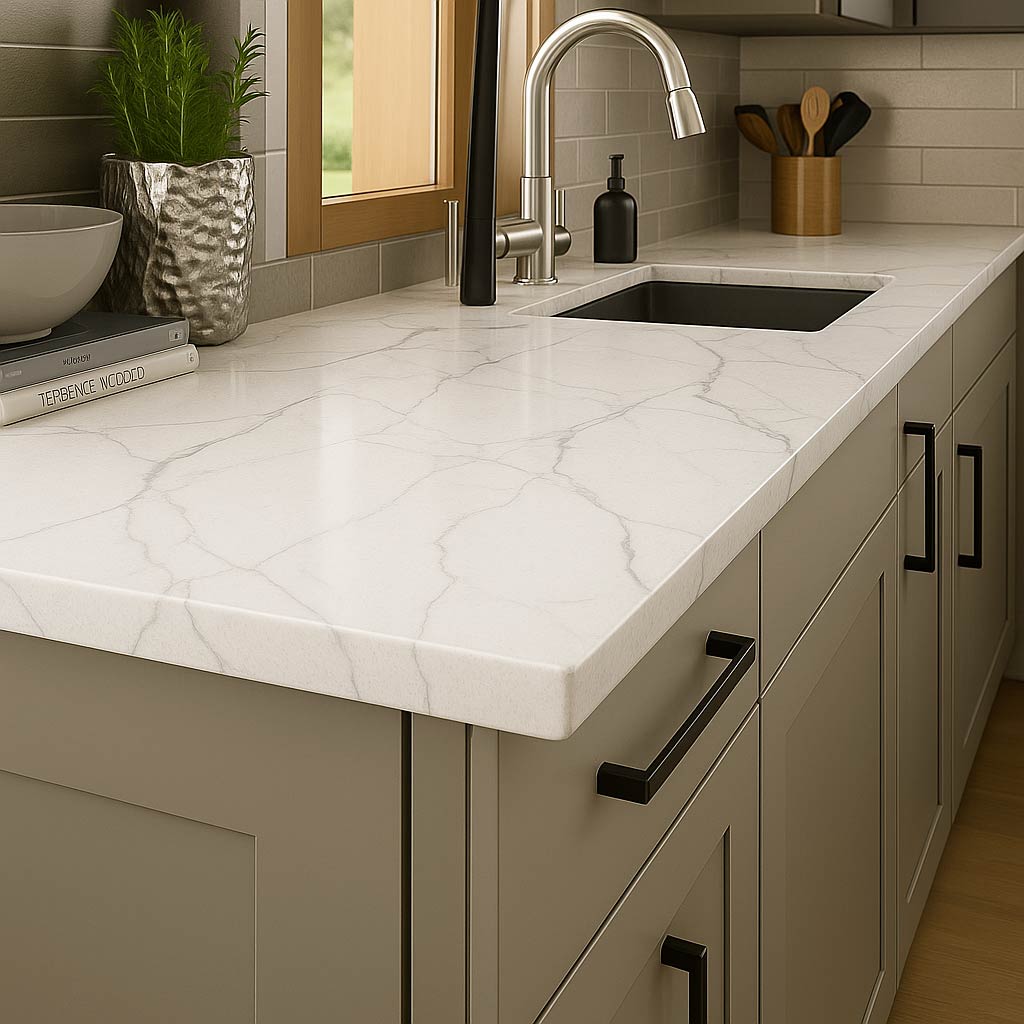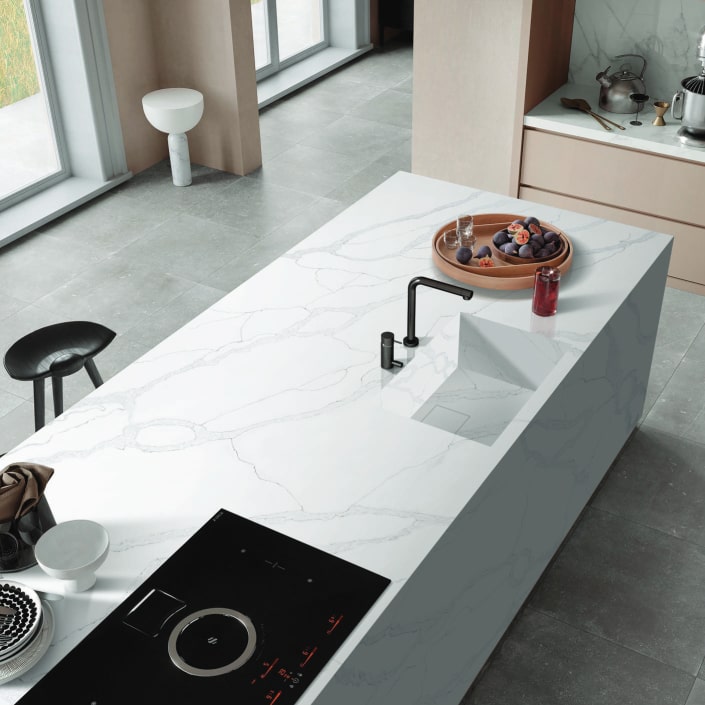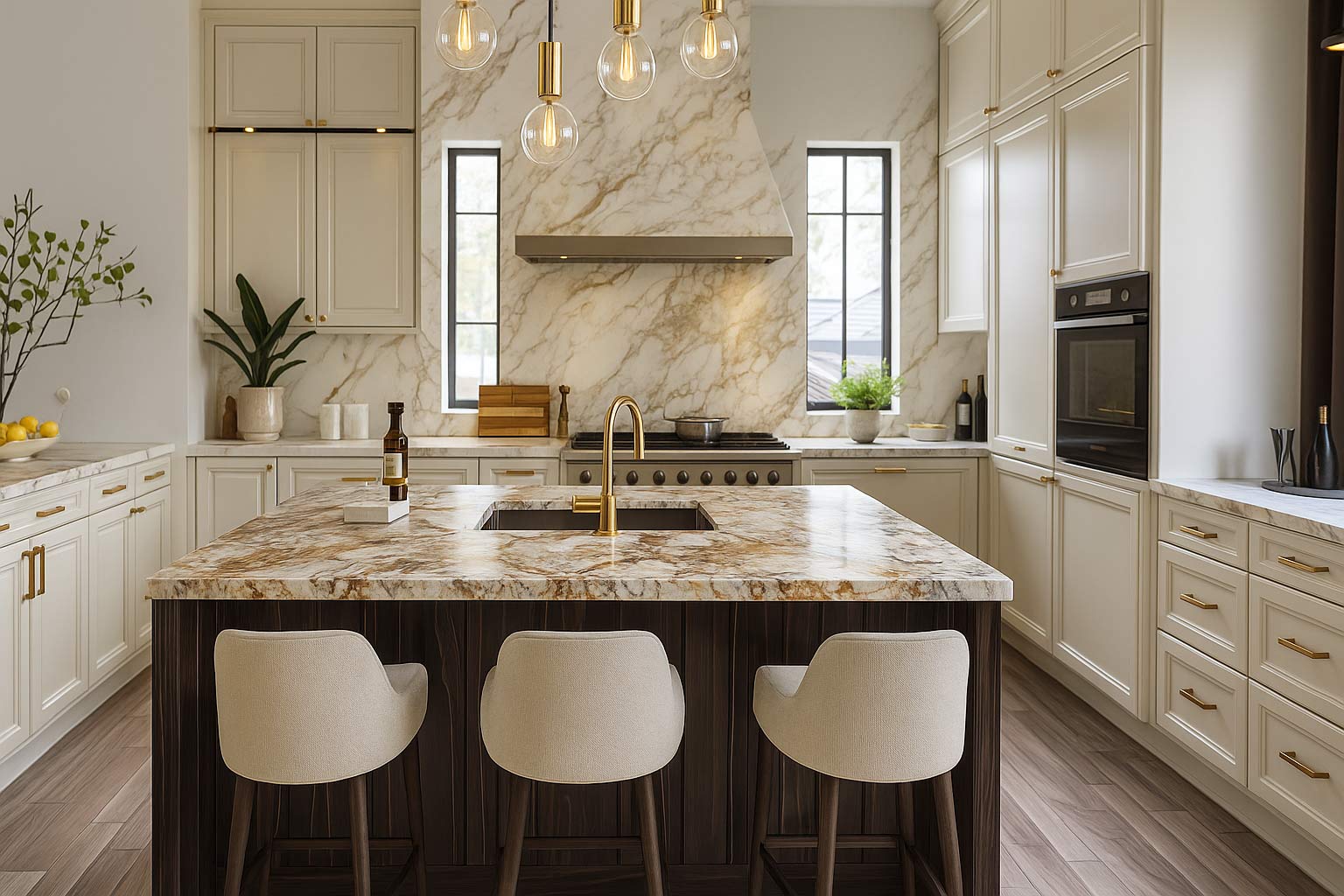Understanding the Basics: Quartz and Granite Defined
Before diving into durability, price, or design, let’s clarify the core difference between quartz and granite countertops — and why this matters in your 2025 remodel.
- Granite is a natural stone formed deep within the earth’s crust. Every slab is unique, with veining, colors, and movement that can’t be replicated. It’s quarried, cut, and polished into shape — a true piece of nature brought into your home.
- Quartz, on the other hand, is an engineered stone. It’s made from 90–95% ground natural quartz crystals, combined with polymer resins and pigments. The result is a durable, non-porous surface that delivers a consistent look and modern feel.
At BlinkGlobal, we guide clients toward materials that align with their design vision and everyday needs — and this foundational difference often defines the direction from the start.
Durability and Strength: Which One Lasts Longer?
When it comes to durability, both quartz and granite rank high — but they excel in different ways.
Granite: The Natural Powerhouse
Granite is exceptionally hard and resilient. It resists cuts, dents, and heat — making it ideal for high-traffic kitchens where cooking is frequent and intense. However, being a natural stone, it has microfissures and pores, which can potentially absorb stains if not properly sealed.
Quartz: Engineered Toughness
Quartz countertops are designed to be scratch-resistant and ultra-durable, with the added benefit of non-porous composition. Unlike granite, quartz doesn’t need sealing and is more resistant to chips around the edges due to its engineered makeup.
Verdict:
If you want natural hardness and don’t mind sealing once a year, granite delivers.
If you want low-maintenance strength with peace of mind, quartz wins.

Stain, Heat & Moisture Resistance: A Practical Comparison
Functionality matters — especially in spaces like kitchens and bathrooms where moisture, spills, and heat are a daily reality.
Stain Resistance
- Quartz: Fully non-porous, meaning it doesn’t absorb liquids, oils, or wine. No sealing required.
- Granite: Naturally porous, which means it can stain if not regularly sealed.
Heat Resistance
- Granite: Known for superior heat tolerance. You can place hot pans directly on it (though trivets are still recommended).
- Quartz: While highly durable, it can be damaged by high heat due to the resins in its composition.
Water & Moisture
- Quartz: Moisture-resistant from the start. Great for bathroom vanities and wet zones.
- Granite: Can handle moisture with proper sealing, but may require more maintenance over time.
Pro Tip from BlinkGlobal: If your kitchen is fast-paced and you want worry-free surfaces, quartz offers peace of mind. For homeowners who want a more natural feel and don’t mind upkeep, granite delivers long-term value.
Maintenance & Care: What Homeowners Should Know in 2025
Maintenance isn’t just a chore — it’s a long-term cost and commitment. Understanding what each material demands will save you time and money.
Quartz Maintenance
- No sealing, ever.
- Easy to clean with mild soap and water.
- No special cleaners needed.
- Highly resistant to mold and bacteria buildup.
Granite Maintenance
- Requires annual sealing to protect from stains and bacteria.
- Needs pH-neutral cleaner (acidic products can etch the surface).
- More prone to harboring bacteria in unsealed pores if neglected.
At BlinkGlobal, we recommend quartz for homeowners who prioritize ease of care and efficiency, especially in busy households or investment properties.
Design Flexibility & Aesthetic Appeal
Countertops play a central role in design — and what works for one kitchen may not work for another. Both materials offer beauty, but in very different ways.
Granite’s Natural Elegance
- One-of-a-kind slab patterns
- Ideal for rustic, traditional, or eclectic designs
- Wide range of natural hues (browns, greens, blues, blacks)
Quartz’s Modern Appeal
- Sleek, uniform look perfect for contemporary or minimalist spaces
- Comes in marble-look veining, matte or polished finishes
- More predictable for multi-surface projects or commercial environments
In 2025, we’re seeing rising demand for subtle veining, neutral tones, and eco-luxe aesthetics — all of which quartz delivers reliably. That said, many still prefer the raw beauty of granite as a natural design statement.
Cost Comparison in 2025: Upfront vs Long-Term Investment
When budgeting your kitchen or bathroom remodel, cost plays a major role — and not just the initial price tag. Let’s break down the total investment for both materials.
| Factor | Quartz (2025) | Granite (2025) |
| Material Cost | $55 – $85 per sq. ft. | $45 – $100 per sq. ft. |
| Installation Cost | $70 – $100 per sq. ft. | $65 – $100 per sq. ft. |
| Sealing Required? | No | Yes (annually) |
| Maintenance Cost (10 Years) | Minimal | Moderate |
| Repair Cost (Chips/Cracks) | Low (rare) | Moderate |
| Resale Value Impact | High | High |
Key Takeaways:
- Quartz offers predictable, bundled pricing and almost no post-installation costs.
- Granite may start lower in cost, but maintenance and sealing can add up.
- For rental properties or low-maintenance homes, quartz is often more cost-efficient long-term.
At BlinkGlobal, we recommend requesting a personalized quote to get clarity based on your location, layout complexity, and project timeline.
Sustainability and Eco-Friendliness
In 2025, homeowners are placing more value on sustainability, ethical sourcing, and air quality.
Granite
- Natural, but energy-intensive to quarry and transport.
- Mining impacts vary based on source country.
- May last longer, reducing material turnover.
Quartz
- Engineered, which means more emissions in production.
- Some brands now use recycled materials and eco-resins.
- Non-porous nature contributes to better indoor air quality.
Eco-Tip: Choose certified sustainable quartz brands or domestically sourced granite to minimize carbon footprint. At BlinkGlobal, we work with manufacturers that prioritize eco-conscious practices and third-party certifications like Greenguard Gold and NSF.


Trending Countertop Styles in 2025
Choosing based on trends helps future-proof your space — especially if resale is on your mind.
Quartz
- Matte & honed finishes over glossy polish
- Waterfall edge islands with continuous veining
- Warm neutral palettes (taupe, clay, greige)
- Thin-profile slabs for a minimalist aesthetic
- Tech-integrated countertops with built-in wireless charging
Quartz is dominating the 2025 market due to its ability to mimic marble, offer bold veining, and meet modern design needs without the natural imperfections of stone.
That said, granite is making a comeback in organic kitchens and artisan-inspired spaces where character and authenticity matter.
When to Choose Quartz Over Granite (And Vice Versa)
Still unsure which material fits your lifestyle? Use this scenario-based guide to match your goals:
| If You… | Choose |
| Want zero maintenance | Quartz |
| Love natural variation | Granite |
| Have young kids or pets | Quartz |
| Regularly use hot pans | Granite |
| Want a uniform look across surfaces | Quartz |
| Prefer sustainability over appearance | Granite (locally sourced) |
| Plan to resell in 5–10 years | Either (depends on design) |
At BlinkGlobal, our design team often helps clients combine both materials in one home — for example, quartz in the kitchen and granite in a statement bathroom vanity.
Professional Installation Matters: Trust BlinkGlobal
The performance of your countertop isn’t just about material — installation quality is everything.
Why Choose BlinkGlobal for Your Countertop Project?
- Precision measurement & fabrication using laser templating
- Seamless edge joining and custom cutouts
- Turnkey services from consultation to installation
- Transparent pricing and material guidance
- Local support with project management expertise
Whether you’re renovating a single home or managing multi-family units, BlinkGlobal delivers solutions that are built to last.
FAQs: Choosing Between Quartz and Granite in 2025
Q: Is quartz still popular in 2025?
Yes, quartz remains one of the top choices in both residential and commercial projects due to its durability, aesthetic variety, and low maintenance.
Q: Does granite need to be sealed every year?artz still popular in 2025?
Most granite countertops benefit from annual sealing, though some dense stones may need it less frequently.
Q: Which is better for resale value — quartz or granite?
Both are valued highly in real estate. The “better” one depends on your region, buyer expectations, and kitchen design style.
Q: Can I place hot pans directly on quartz?
It’s not recommended. Quartz is heat-resistant but can discolor or crack under direct, prolonged heat.
Final Verdict: Which Countertop Material Wins in 2025?
There’s no universal winner — but there is a right choice for you.
Choose quartz if you want:
- Effortless maintenance
- A modern, consistent look
- Better stain and bacteria resistance
Choose granite if you value:
- Natural, unique patterns
- High heat tolerance
- A connection to organic materials
Looking for the best countertop material in 2025?
Here’s a quick breakdown: Quartz is ideal for low-maintenance, modern kitchens, while granite offers unmatched natural beauty and heat resistance. Your final choice depends on lifestyle, budget, and design goals — and we’re here to help you decide with confidence.

